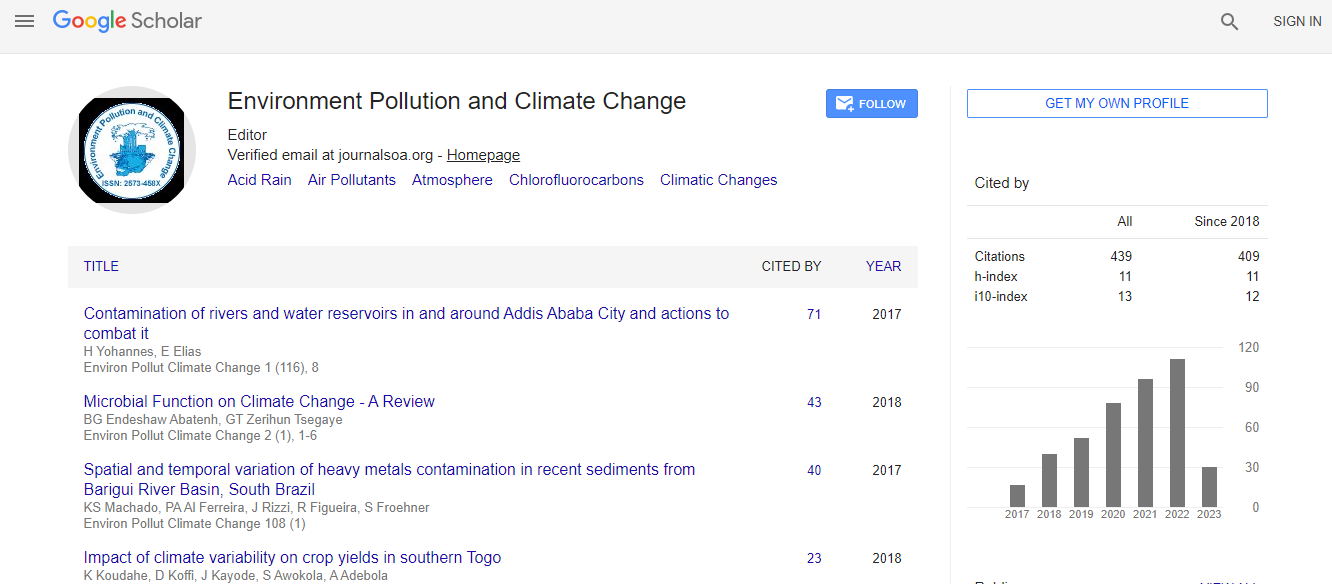Our Group organises 3000+ Global Conferenceseries Events every year across USA, Europe & Asia with support from 1000 more scientific Societies and Publishes 700+ Open Access Journals which contains over 50000 eminent personalities, reputed scientists as editorial board members.
Open Access Journals gaining more Readers and Citations
700 Journals and 15,000,000 Readers Each Journal is getting 25,000+ Readers
Google Scholar citation report
Citations : 672
Environment Pollution and Climate Change received 672 citations as per Google Scholar report
Environment Pollution and Climate Change peer review process verified at publons
Indexed In
- Google Scholar
- Publons
- Euro Pub
- ICMJE
Useful Links
Recommended Journals
Share This Page
The energy-water-health nexus under climate change in the United Arab Emirates-impacts and implications
Joint Event on 5th World Conference on Climate Change & 16th Annual Meeting on Environmental Toxicology and Biological Systems
William W Dougherty
Climate Change Research Group, USA
ScientificTracks Abstracts: Environ Pollut Climate Change
Abstract
Climate change poses serious energy, water and health challenges for the United Arab Emirates (UAE). While closely interconnected, the development of sustainable energy, water and health policies has typically been viewed as independent, sector-specific planning challenges. However, changing demographics, a rapidly growing economy, increasing reliance on desalination, and worsening air qualityâÂÂall taking place as climate change unfoldsâ suggest a need for a more integrated approach to risk management. Accounting for the interactions between an âÂÂenergy-water-health nexusâ is one way to ensure that development strategies are considered within a framework that addresses the range of potential tradeoffs, risks, and synergies. To address the energy-water-health nexus under a changing climate, research activities were undertaken as part of the Local, National, and Regional, Climate Change Programme (LNRCCP) of the Abu Dhabi Global Environmental Data Initiative (AGEDI). Climate change modeling at the regional spatial scale (Arabian Peninsula; Arabian Gulf) was first carried out to establish the atmospheric and marine physical conditions that will underlie energy, water, and health challenges in the future. The results of this modeling were then used as inputs to an analysis of policies that aim to account for the linkages across the energy-water nexus in one hand and the energy-health nexus on the other. The results show that climate change will render an extreme hyper-arid climate even more so, while the waters of the Arabian Gulf will experience heightened salinity, changing circulation patterns, and higher temperatures under intensifying desalination activities. The analysis of the energy-water nexus shows that a range of water/energy efficiency and renewable energy measures can lead to significant reductions in energy use and annual greenhouse gas emissions, while coming at negative societal cost. The analysis of the energy-health nexus shows that the gradual introduction of energy efficiency and renewable energy measures can lead to substantial decreases in premature mortality and health care facility visits in urban areas. Recent Publications 1. Schile L, Kauffman J, Crooks S, Fourqurean J, Campbell J, et al. (2018) Limits on carbon sequestration in arid blue carbon ecosystems. Ecological Applications 27(3): 859âÂÂ874. 2. Dougherty W, Yates D, and Kucera P (2017) Public health cobenefits of the diffusion of innovative greenhouse gas mitigation technologies in Abu Dhabi, Innovative Energy & Research S1:002. 3. Haidera M, Alhakimi S, Noaman A, Al Kebsi A, Noaman A, et al. (2011) Adapting to climate change-water scarcity for Yemen's vulnerable communities. Local Environment 16(5):473âÂÂ488. 4. Dougherty W, Kartha S, Rajan C, Lazarus M, Bailie A, et al. (2009) Greenhouse gas reduction benefits and costs of a large-scale transition to hydrogen in the USA. Energy Policy 37:56âÂÂ67.Biography
William W Dougherty has worked over the past 20 years on a wide variety of climate change related issues, with an emphasis on greenhouse gas mitigation and adaptation to climate change. He has assisted governments in the development of national GHG mitigation and adaptation strategies, led vulnerability assessments, formulated project documents, analyzed energy efficiency and renewable energy options for achieving emission reductions, and contributed to the development of methodological approaches, training programs and software tools that are used throughout the world. He has been invited as a Speaker or Expert Participant in meetings of the World Bank, United Nations Department of Economic and Social Affairs, the United Nations Development Programme, the African Development Bank, the World Future Energy Summit, and the United Nations Environment Programme. He has worked throughout North Africa, Sub-Saharan Africa, and the Middle East in support of national government agencies, multi-lateral organizations, and development banks. He has authored or co-authored over 100 research reports.
E-mail: billd@ccr-group.org

 Spanish
Spanish  Chinese
Chinese  Russian
Russian  German
German  French
French  Japanese
Japanese  Portuguese
Portuguese  Hindi
Hindi 
